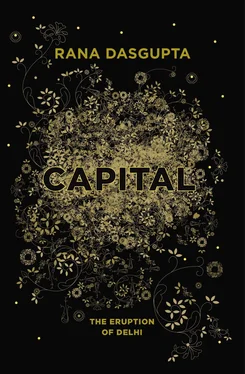— Indira, jewellery designer
On 24 July 1991, Manmohan Singh, India’s new finance minister, announced in his budget speech that his nation would henceforth embrace the principles of open markets and free enterprise. Life changed immediately, even in its most basic elements. A new landscape appeared: as one person remarked to me, “Before that I had never seen the colour pink.”
It could be said that India’s departure from the centrally planned, closed-economy orthodoxy that had prevailed since Independence was slow in coming. After all, India’s traditional exemplar, the Soviet Union, had already passed into history. A free-market doctrine — the ‘Washington Consensus’ — had gripped the world’s power centres for the entire previous decade, leading to the — frequently forcible — conversion of much of Latin America and Africa. Even within India, free-market advocates — among them Manmohan Singh himself, who was a respected economist — had been pushing since the 1970s for state controls to be relaxed. But such appeals, seen as ‘pro-business’ and ‘anti-populist’, had always proved politically unviable, and even those pro-market concessions that were implemented before 1991 were usually rolled back in the approach to elections. The fact was that any politician who came out and said that the so-called ‘Socialist’ system did not work implied, thereby, that he or she was disloyal to the sacred legacy of the nation’s founding father, Jawaharlal Nehru.
Like Manmohan Singh half a century later, Nehru had studied at Cambridge University — as, too, did his opposite numbers in the independence struggle: the king-emperor George VI and the viceroy, Lord Mountbatten (Nehru was the only one of these three to complete his degree). Having gone to Harrow before Cambridge, Nehru had lived in England from 1905 until the end of his undergraduate studies in 1912, and he was in nearly every respect more like the British rulers whose eviction he superintended than the 350 million people he then undertook to govern. But his vision for the society he would build in India was radically different from that of the departing British. What had inspired him at Cambridge was not the British empire’s laissez-faireism but the social engineering of its Fabian Socialist intellectuals. He disliked the excessive luxury of Britain’s landed aristocrats, industrialists and bankers, and felt they had no place in the modern republic. He wanted to rid India not only of British rule but also of the economic system with which, he felt, Britain had pauperised India, whose per capita income had not increased at all between 1757 and 1947. 2
Nor was this Nehru’s private view alone. The independence movement owed its origins in part to a 1901 book — Poverty and Un-British Rule in India — whose detailed analysis of India’s economic flows found that the principle cause of its contemporary poverty was the enormous drain exerted on Indian wealth during the British era — wealth that had accounted as recently as the seventeenth century for a spectacular 25 per cent of global GDP. The book’s author, Dadabhai Naoroji, was no hot-headed amateur. Writer, publisher and professor at both Bombay University and University College London, Naoroji was also a wealthy and successful cotton merchant who became the first Indian magnate to set up his own British subsidiary. Beyond all this, Naoroji set up one of the first associations devoted to the advancement of the status and interests of the Indian peoples. Drawn increasingly into politics, he served as prime minister of Baroda and, later, as Liberal member of parliament for Finsbury Central: as the first Indian to be elected to the British parliament, he was able to express in London’s power establishment his analysis of the injustices of imperial rule both in India and Ireland. By the time Nehru returned from Cambridge, Naoroji too was back in India and serving for the third time as president of the Indian National Congress — the political vehicle for India’s eventual independence campaign, and the foundation of the post-Independence Congress Party, which dominated the country’s democracy until the 1970s — which Nehru would himself later head.
A decade after Nehru’s return to India, as his political career began, he was enraptured by the news of the Bolshevik revolution — and within the independence movement he was the most vocal and articulate of those who argued for a centrally planned economy. Nehru was a modern, and he was filled with that modern dream of the total society, in which injustice, inequality and indeed all of human beings’ baser drives would be defeated by the perfect nation system. His 1927 visit to the USSR, where he attended the tenth anniversary celebrations of the revolution, filled him with hope and excitement. The book he later wrote about this visit overflows with awe at the Soviet achievement: the industry, the art, the high-minded bureaucrats — the enterprise so majestic that even its failures were difficult to judge too harshly. In Russia, Nehru did not — or could not — see the luxurious few lording it over the miserable many. The image he brought away with him was that of Mikhail Kalinin, chairman of the Central Executive Committee — and head of state — wearing peasant clothes and receiving a salary that was barely more than that of a worker. “Russia thus interests us,” he wrote, “because it may help us to find some solution for the great problems which face the world today. It interests us specially because conditions there have not been, and are not even now, very dissimilar to conditions in India. Both are vast agricultural countries with only the beginning of industrialisation, and both have to face poverty and illiteracy. If Russia finds a satisfactory solution for these, our work in India is made easier.” 3
As prime minister of India, then, Nehru embarked on a bold experiment — one whose incongruities would hold together only while he, with his unique aura, was around to ensure it. On the one hand, incredibly, he made this largely feudal country instantly and indiscriminately democratic. The constitution granted universal suffrage to adult citizens, despite the fact that only 12 per cent of them could read, and contrary to a widespread feeling that it was dangerous — and unnecessary — to give the country’s fate away to people so ignorant of democracy that it would never occur to them even to ask for it. Nehru and his colleagues in the Constituent Assembly, which drafted the constitution, were in this respect liberals of affecting conviction who unhesitatingly gave guarantees to the justice, equality and liberty of all citizens and to the freedom of the press. The fact that this gamble — of democracy and stable liberal institutions — paid off and endured is deservedly seen as an extraordinary legacy of India’s founding politicians, and it is has secured for Nehru himself a posthumous aura of quasi-divine rectitude and foresight.
On the other hand, Nehru felt, having studied the rapid industrial development of Japan and the Soviet Union, that only the state would be able to drive economic expansion fast enough to realise his fledgling nation’s epic dreams — and he instituted a centrally planned economy inspired by that of the USSR. India’s growth and modernisation would be achieved through a series of Five-year Plans which would harness the nation’s resources into coordinated forward thrusts. These Plans reached their height of intellectual rigour with the Second Plan, conceived by a man named Prasanta Chandra Mahalanobis, who had previously founded the Indian Statistical Institute and who combined just the attributes guaranteed to endear him to Nehru: a learned appreciation of big systems, a degree in physics from Cambridge, and a love of ancient Indian philosophy. On his appointment to the Planning Commission, Mahalanobis visited England, the USA, France and the USSR to discuss with the world’s leading statisticians and economists the question of how state investment could best reach the sectors that needed it, at the appropriate time and in the appropriate quantity, in order to ensure holistic long-term growth.
Читать дальше











